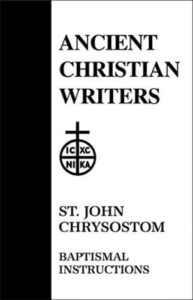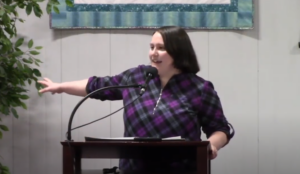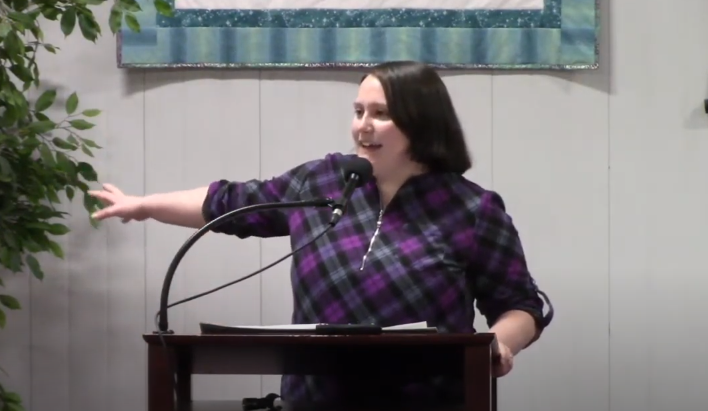LEARNING TO LOVE OUR NEIGHBORS ACROSS TIME AND SPACE
Karen Cooke
As often as it happens, it still surprises me. A few months ago, the shock came while reading John Chrysostom. I was enjoying learning more about his teachings until I came to the passage about the “weakness of women’s nature and the unsteadiness of their wills”[1] which led into an extensive teaching against makeup including statements that it “will destroy the beauty of your soul” and calling women who wear makeup “careless of their own salvation.”[2] He blamed men’s lust on the women they desired.
 For someone who loves the Church and her history, it can be tempting to write off these errors. Chrysostom lived hundreds of years ago. We should not expect his ideas of gender to reflect modern values. His texts are still helpful and can inform our theology and worship in true and healthy ways. However, I have found that if I focus too hard on ignoring something, it quickly becomes the only thing I see. These flaws (in Chrysostom and other Christian writings) are not something that I can unread, and I have found that the only way to see beyond them is to take the time to recognize and wrestle with them.
For someone who loves the Church and her history, it can be tempting to write off these errors. Chrysostom lived hundreds of years ago. We should not expect his ideas of gender to reflect modern values. His texts are still helpful and can inform our theology and worship in true and healthy ways. However, I have found that if I focus too hard on ignoring something, it quickly becomes the only thing I see. These flaws (in Chrysostom and other Christian writings) are not something that I can unread, and I have found that the only way to see beyond them is to take the time to recognize and wrestle with them.
Perhaps the thing that disturbs me about these sentiments is that there is a familiarity to them. While the language is different in the modern day and there is a greater attempt at subtlety, one of the reasons I cannot ignore these statements is that I have heard all of them echoed in conversations within the last year. These theologies, while less common and direct in the modern age, have not fallen out of use. We cannot assume that the modern reader will recognize that these statements encourage incorrect and harmful theologies.
As we use these texts, a part of using them responsibly is taking care to extend and encourage the good theology that they teach and not the bad. Realistically, if we want those who will be hurt by these statements to benefit from the wisdom of our predecessors in the faith, we will need to address and work through these problems in the text. This does not only apply to issues of gender, I use this as an example because it is readily apparent to me, but similar things could be said about anti-Semitism in historic Christian writings as well as other forms of racism and prejudice. I believe that wrestling with such problematic elements of the text will help us to be more faithful scholars and more faithful believers. To love our neighbors well, we need to foster good theology which will point them towards truth and a closer relationship to God.
In addition to these considerations, I would argue that the call to love our neighbors does not only apply to those we are studying with or teaching today. The call to love our neighbor extends not only across geographical divides but also temporal ones. It includes a brother like John Chrysostom who lived hundreds of years ago. We cannot love these neighbors if we look at demonized versions of them which focus only on their flaws.
All humans are flawed and every time, including our own, has its own tragedies and blind spots. Additionally, we will lose rich theological and spiritual resources if we do this. However, idealizing these figures can lead us to loving a fictionalized version of them rather than the actual people. When we can get past demonized or idealized versions of people and look at them honestly, we get closer to loving our neighbors as the beautiful and flawed people that they are. Naming the problems of our theological resources and wrestling with them honestly allows us to better refine our theology and opens doors for those who are hindered by these problems to work through them and find the theological treasures in other elements of the text.

For scholars who love these writers and their works, there can be a temptation to jump straight to making excuses for them, to push for reading them within their historical context and offering grace and the recognition that modern texts also have problems. While it is good and helpful in our pursuit of loving these authors to recognize their context and offer grace to them, and it is appropriate to avoid cultural chauvinism, starting here can be problematic. When we start by excusing these flaws, we minimize the harm that they have done and could continue to do if not critically engaged as well as sidestepping a difficult but potentially fruitful theological discussion. Addressing these problems in a healthy manner will take us down a much harder road where we struggle with the good and bad that we find in texts, especially those we love. I wish that I had a step by step process that solves all of the problems of these texts, but my only answer right now is to keep discussing them holistically and asking hard questions without being deterred by the fear of making people uncomfortable.
As a final note to scholars who love these beautiful and flawed humans, do not be surprised or disturbed when your students, classmates, or others you meet along the way struggle to look for good in these texts. It is sad for them to miss out on this aspect of our heritage, but it is not their fault that their experience of these writings has been tainted by the sinful attitudes and theologies of the author. It is not easy to learn to look for the good in someone who undermines your humanity or the humanity of those you love, it is even more difficult to learn to extend love to such a person. Have grace for those who struggle to do so.
[1]Paul W. Harkins, trans., St. John Chrysostom: Baptismal Instructions, Ancient Christian Writers 31 (New York: Paulist, 1963), 36.
[2] Harkins, St. John Chrysostom: Baptismal Instructions, 38.


